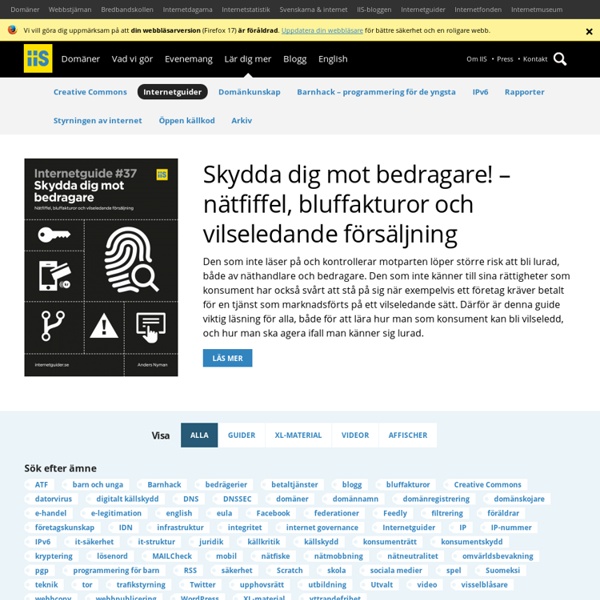



https://www.iis.se/lar-dig-mer/guider/
Related: Barn och unga på nätet, sociala medier... • InternetA Starting Point for Ensuring Student Online Privacy Our society is struggling with issues regarding individual privacy. Heated debates are occurring on topics that range from whether the government should be allowed to conduct mass surveillance of citizens to the information that companies should be allowed to collect based on one's computer activity -- and what they should be allowed to do with it. There are also concerns about the security of personal data in general -- consider the data breach at Target last year. A Complicated Issue A January 2014 survey of registered voters released by CommonSense Media found that 90 percent of respondents are either very or somewhat concerned with how private companies with non-educational interests are able to access and use students' personal information.
Digital Literacy and Citizenship Curriculum – Know your web – Good to Know – Google At Google we believe in the power of education and the promise of technology to improve the lives of students and educators -- leading the way for a new generation of learning in the classroom and beyond. But no matter what subject you teach, it is important for your students to know how to think critically and evaluate online sources, understand how to protect themselves from online threats from bullies to scammers, and to think before they share and be good digital citizens. Google has partnered with child safety experts at iKeepSafe, and also worked with educators themselves to develop lessons that will work in the classroom, are appropriate for kids, and incorporate some of the best advice and tips that Google's security team has to offer. Class 1: Become an Online Sleuth In this class, students will identify guidelines for evaluating the credibility of content online. We are always looking to improve these classes.
10 Internet Technologies Educators Should Be Informed About – 2011 Update These Technologies Are Changing Education. Are You Familiar With Them? It’s been nearly two and half years since the publication of the first “10 internet technologies that educators should be informed about” article on this site and given the fast paced evolution of technology it’s time for an update. Cyberbullying - let's fight it together The music throughout the film is a song by Ben Folds called Still Fighting It. You can listen to it here: JOE: Um … Hi. My name’s Joe. I don’t really have anyone to talk to, so … I thought I’d tell my story like this. When it all started, I just tried to laugh it off.
Lesson Plans – Search Education – Google Picking the right search terms Beginner Pick the best words to use in academic searching, whether students are beginning with a full question or a topic of just a few words. View lesson Collaborative writing software online with Writeboard. Write, share, revise, compare. Hello, We launched Writeboard back in October of 2005 as a stand-alone service. A few years later we integrated Writeboards into Basecamp Classic and Backpack. Today, the vast majority of Writeboards are created inside those two products. As part of refocusing on Basecamp, we’ve decided to retire Writeboard.com. You’ll still be able to create Writeboards inside Basecamp Classic and Backpack, but you’ll no longer be able to start new stand-alone Writeboards here at Writeboard.com.
edutopia Is Social Media Relevant? Take the Quiz Before we talk social media, let's talk about the relevance of social media by taking a quiz. Which of the following is most likely to be true? ☐ Should we teach letter-writing in the classroom? Kids need to write letters and mail them. Battling Fake News in the Classroom In this post-election period, there has been a lot of discussion about fake news, particularly about how it is spread and shared online, and whether it influenced the recent presidential election. On November 22, Stanford University released an influential study showing that middle and high school students—and even some in college—have trouble distinguishing which online resources are credible. The inescapable fact is that young people need to be prepared for the Wild West of information that they live in and will grow up in. It is also imperative that we, as educators, prepare young people for the important job of responsible and informed citizenship. Media Literacy and “Crap Detection” Teaching media literacy is not new, but with the explosion of social media and the lightning speeds at which information is shared, critical evaluation skills have never been more important.
- iPad apps for children with special needs 0 Comments March 25, 2011 By: Guest Blogger Mar 24 Budd-e Stay Smart Online Share: Website: budd-e.staysmartonline.gov.auDescription: A superb e-safety resource with separate sections for primary and secondary students to work through. Choose to sign in to save progress or use without signing in.Category: Digital & Web Tools > E-safety & Web Savvy
SWGfL Digital Literacy - Curriculum Overview Return to the Top KEYFS / Key Stage 1Key Stage 2Key Stage 3Key Stage 4 / 5Download this page (PDF) All About Apps for (Special) Education I keep finding more and more excellent resources around using iPads, iPods and Apps in (Special) education and wanted to share some of my favourite links with you. The first comes from the great Victorian Government site called Ipads for Education .